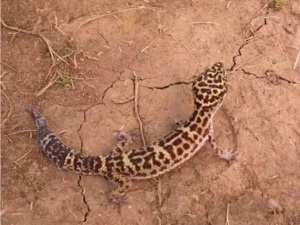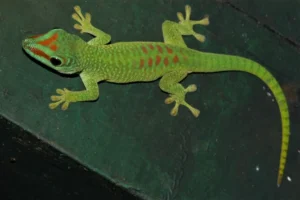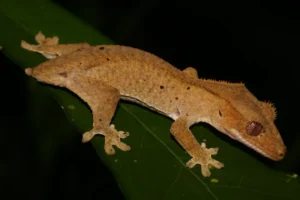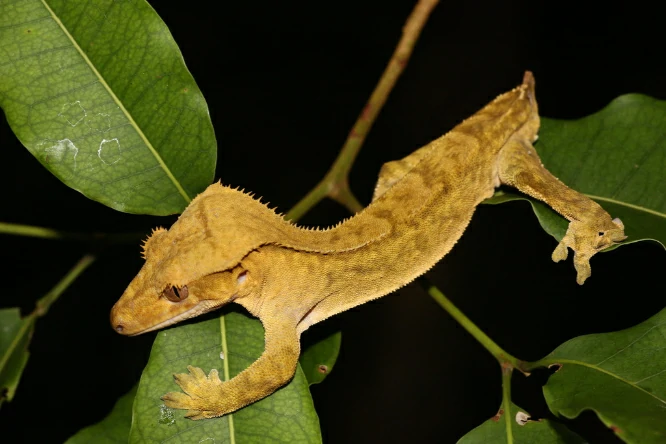If you’ve ever watched a gecko chase a fly across a wall, you probably noticed how serious they are about food. They dart, jump, and snap it up so fast you barely see it happen.
But if you have one as a pet, you might wonder something that sounds simple but actually isn’t: do geckos really need live food, or can they eat something easier, like dried insects or powdered diets?
Yes, most geckos do need live food, especially insectivorous species like house geckos and leopard geckos. They rely on the movement of live prey to start hunting, and live insects like crickets, roaches, and worms also give them important nutrients and moisture that dried foods usually don’t have. Some larger or omnivorous species can eat pre-killed or prepared foods, but live prey is still the most natural and healthy option for most geckos.
That’s because geckos aren’t just eating, they’re hunting. The chase, the strike, and even the crunch of a live cricket all play a part in how they feed.
Without that movement, some geckos actually lose interest and may refuse food completely.
Why Live Food Is So Important for Geckos
In the wild, geckos never find food that just sits there. Their diet is all moving insects: crickets, moths, beetles, termites, and tiny spiders they catch at night.
So when you put a still meal in front of them, it just doesn’t register as food in their brains.
For geckos like house geckos or leopard geckos, hunting is built into how they act.

Their eyes are really sensitive to movement in low light, so a wriggling cricket immediately grabs their attention.
A dried insect or pellet might not even look like food.
Think about trying to feed a cat a toy mouse painted to look like meat. It might sniff it, but it won’t bite. That’s kind of how geckos feel about still food.
What Live Food Geckos Eat
Different geckos like slightly different things, but most pet geckos do best on a few staple insects you can get at any pet store.

The key is to give them a mix, not just one type every time.
Here are the most common live foods:
-
Crickets – A classic that most geckos chase right away. They’re active, easy to find, and full of protein.
-
Mealworms and superworms – Good for variety, but don’t feed them all the time since they have more fat and less moisture.
-
Dubia roaches – Nutritious, easy to digest, and don’t jump or smell like crickets. Many gecko owners love these.
-
Waxworms – A treat, not a main meal. Geckos love them, but they’re high in fat, kind of like candy.
Some geckos, especially tree-dwelling species like crested geckos, also like soft fruit or nectar blends. But even they still benefit from occasional live insects to stay active.
Can Geckos Eat Dead or Dried Food?
This is where it gets tricky. Some owners try dried mealworms or powdered diets because they’re cleaner and easier to store. Sounds convenient, right?
But most geckos just won’t eat food that doesn’t move.
Even if they do eat it, dried insects lose a lot of moisture and nutrients, especially vitamins A and E. That can lead to dehydration and nutrient problems over time.
There are exceptions. Crested geckos and day geckos naturally eat some fruit. They can do well on prepared diets that mix with water into a soft paste.

These are made for them and have all the right nutrients. But even then, many owners still give a live cricket or roach now and then to keep them active and happy.
Why Some Geckos Won’t Eat Without Movement
If you’ve ever had a gecko just stare at its food bowl, you’re not alone. Many geckos are “trigger eaters,” which means they eat when they see movement, not when they smell food.
For example:
-
Leopard geckos often won’t touch mealworms unless they’re wriggling. Some owners wiggle the worms with tweezers to get them started.
-
House geckos usually ignore food that doesn’t crawl or flutter. They rely on sight and motion more than smell.
-
Tokay geckos are big hunters and need the chase to stay active.
Even if you use pre-killed insects, moving them a little helps, like using feeding tongs to mimic movement. Some people even shake a container gently before feeding so the insects start moving again.
Why Live Food Is Healthier
Live insects aren’t just fun for your gecko, they’re healthier too. They have natural moisture, soft fats, and enzymes that help digestion.
When your gecko eats live crickets or roaches, it also gets trace minerals and tiny gut bacteria that improve its gut health.
Most keepers gut-load their insects before feeding. That means feeding the insects nutritious stuff like vegetables, grains, and calcium powder.
Then, when your gecko eats the insect, it gets all those extra nutrients too.
You can also dust live insects with calcium or vitamins right before feeding. This is very important for young geckos or breeding females because calcium helps keep bones strong.
What Happens If a Gecko Doesn’t Get Live Food?
If a gecko goes too long without live or fresh food, you might notice changes in its behavior or health:
-
It might eat less or stop eating altogether.
-
It could lose weight and muscle tone.
-
It may move less or hide more.
-
Its bones could get weaker over time if calcium is low.
For insect-eating geckos, skipping live food too long can cause long-term problems. Even if they survive on dried or powdered diets, they won’t really thrive.
Are There Geckos That Don’t Need Live Food?
A few species can do fine without live insects, mainly crested geckos, gargoyle geckos, and day geckos. They naturally eat fruit, nectar, and soft insects, so prepared diets made for them work well.

These diets come as a powder that you mix with water into a paste. They have fruit puree, protein, and all the vitamins and minerals a gecko needs. Many owners feed this 3–4 times a week and still give live crickets sometimes for fun.
Even so, most crested geckos still enjoy live insects. It keeps their natural hunting instincts active.
Feeding Tips for Pet Owners
Feeding a gecko at home doesn’t have to be complicated, but it should be thoughtful. A few simple things make a big difference:
-
Feed at night. Most geckos are nocturnal and like to hunt after dark.
-
Use feeding tongs. You can move insects slightly to get their attention.
-
Remove uneaten bugs. Crickets can bite geckos if left in the tank overnight.
-
Don’t overfeed waxworms or superworms. They’re fine as treats, not everyday meals.
-
Keep insects healthy. Feed your bugs well before giving them to your gecko.
A Quick Look at Different Gecko Diets
| Gecko Species | Needs Live Food? | Typical Diet | Notes |
|---|---|---|---|
| House Gecko | Yes | Crickets, roaches, moths | Mostly insect-eating |
| Leopard Gecko | Yes | Crickets, mealworms, roaches | Needs calcium supplement |
| Crested Gecko | Optional | Commercial fruit mix + insects | Can live on powdered diet |
| Tokay Gecko | Yes | Roaches, crickets, small lizards or mice (in wild) | Strong hunter |
| Day Gecko | Optional | Fruit mix + insects | Benefits from live prey sometimes |
Can You Train a Gecko to Eat Non-Live Food?
Sometimes yes, but it takes patience. Some geckos can learn to eat pre-killed insects if you make them move a bit. Others never adjust.
A few owners slowly reduce motion over time. Start by feeding wriggling insects with tongs, then offer pre-killed ones while wiggling them slightly. Eventually, the gecko may link the shape and smell with food, even if it doesn’t move.
Still, many species never fully adjust, so it’s best to stick with what comes naturally.
Why It’s Worth It
Feeding live food might feel like extra work, but it’s one of the best parts of keeping a gecko. Watching that lightning-fast tongue flick out or that careful stalk across the glass feels like seeing nature up close.
It keeps your gecko active and prevents boredom. And nutritionally, it’s the most complete way to feed them.
Think of it like this: you could live on meal replacement shakes, but a real meal is always better. That’s how it is for geckos and live insects.
Conclusion
So, do geckos need live food? For most species, the answer is yes, they really do. Live insects keep them healthy, hydrated, and mentally active, and they’re simply what geckos are made to eat.
Some fruit-eating geckos can survive on commercial diets, but even they light up when they get a chance to chase a cricket. If you want your gecko to be not just alive but happy and thriving, live food isn’t just an option, it’s part of what makes them geckos.
Hi, my name is Ezra Mushala, i have been interested animals all my life. I am the main author and editor here at snakeinformer.com.

